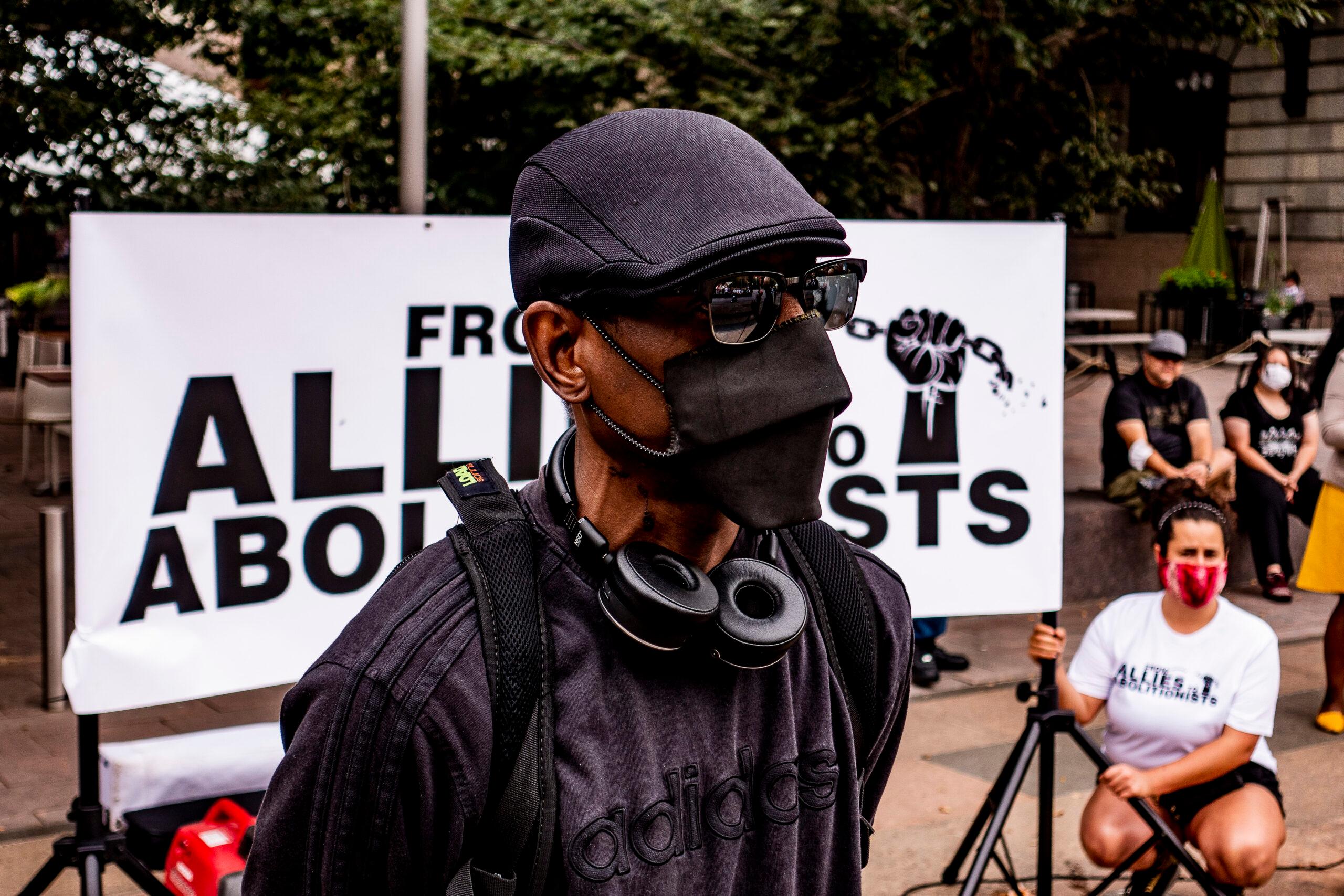In 2018, Raverro Stinnett was an artist to watch. He was studying art on a full scholarship at the Rocky Mountain College of Art and Design and had begun to make a name for himself in Denver's art scene through his fine art and photography. That year, he was set to become an artist in residence at the RedLine Gallery.
Then, on April 28, 2018, Stinnett left a gala at RedLine. He walked to Union Station to catch a train home and sat down on a bench to wait. He'd been there just 30 minutes when he was harassed because he was Black by security guards from Allied Universal Security, a group that partners with RTD. One of the guards led Stinnett away from cameras into a station bathroom and beat him so brutally that he suffered a severe brain injury.
Stinnett survived, but he lost something essential: The assault left him with permanent brain damage that impaired his ability to create art. In a recent interview with CPR, Stinnett said that every time he tries to paint or sketch, he bursts into tears.
Two years after the incident, three of the four officers involved have been sentenced to prison. But RTD still maintains its partnership with Allied Universal Security, and Stinnett has not been paid damages, despite steep medical expenses and the loss of his main source of income.
This last May, friends of Stinnett's asked Jeff Campbell, the founder and executive director of Emancipation Theatre Company, to chair the Justice for Raverro campaign. They hoped to garner widespread awareness of Stinnett's case and to pressure RTD to cut ties with Allied Universal.
"At first I resisted, because, you know, it was in the middle of COVID. And I was really looking for how to get myself together, quite frankly," Campbell said. "And then George Floyd happened."
Campbell jumped into action. He formed an activist group called Allies to Abolitionists, pairing folks who are newer to the racial justice movement with those already on the frontlines. He drafted a PSA about Stinnett's case and released it on July 4, including in it a petition that, within ten days, acquired 3,000 signatures. On July 14, Campbell brought that petition to a press conference at Union Station, where he handed it to newly appointed RTD director Shontel Lewis. From there, he and other campaign workers flooded RTD board meetings, bombarding the transit agency with questions to get Allies to Abolitionists' demands on record.
Campbell says he's a writer, not an activist. He planned to concentrate Allies to Abolitionists' efforts into a 90-day campaign, the culmination of which would be a work of theatre: a big art piece to celebrate the work they'd done while also pushing their message forward in a different, digestible format.
"We're storytellers. That's the role we play in the activism paradigm," Campbell said. "The objective is to raise awareness and support, so that concerned citizen will know where to go, and how to plug in, and how to act."
On Friday, Emancipation Theatre Company will release a multimedia production called I Am Raverro, the story of Raverro Stinnett. Written by Campbell and directed by Jeannene Bragg, the community engagement organizer at Curious Theatre, the show will walk viewers through Stinnett's story via the different perspectives of the people who played a role in it.
Knowing that the play would premiere in the middle of the pandemic, Campbell and Bragg considered ways to make the show accessible and safe for cast, crew and audience members. They decided that the play would never premiere live, and that cast members would never rehearse a scene together. Instead, it would be recorded in advance to be later viewed at socially distant screenings or at home.
Campbell and Bragg decided upon a small cast who'd present the narrative through a series of monologues to limit interaction between the actors. Each actor's monologue was shot separately onstage at the Armory and strung together with edits and montage sequences to retain the feel of live theatre. As each actor performs, projections play behind them -- sometimes video montage, sometimes scenic backdrops or images of Stinnett's art. The production is interwoven with narration by Campbell and a score created by musician Conrad Khen and the Playground Ensemble.
Each performer offers a different window into Stinnett's story. Vocalist Merrian Johnson opens the show with a song. Meghan Frank, a friend of Stinnett's, plays herself, providing the perspective of someone who knows and cares about him. Laura Chavez represents the apathetic voice of RTD, and Campbell said he based Chavez's monologue on Allies to Abolitionists' actual interactions with RTD representatives.
"We have attended the RTD meetings virtually," he said. "So we plan on using their words against them."
Sam Gilstrap plays the security officer who assaulted Stinnett. Campbell said that his character's monologue was sourced from research done by members of Allies into Abolitionists, who examined more than 150 cases across the country in which members of Allied engaged in harassment or violence. Campbell said he also used the officer's own confession as inspiration for the piece.
Bragg says the officer's monologue can be particularly difficult to hear.
"We've given voice to the ugliness that would live inside someone that would allow them to do this to another human being," she said. "But it also, I think, increases awareness and understanding. For me, at least, it increases compassion for the people brutalized by that sort of ideology. It's brutal. And I think we have to deal with the fact that there are people who believe those things and are even promoting that ideology in our society."
The play also features a guest appearance by RTD director Shontel Lewis, who came into the director position after Stinnett was assaulted and has since worked to push a resolution that would reimagine safety and security for public transit. For her monologue, Lewis will read a portion of her proposed resolution, which she said failed to pass this summer.
"Shontel Lewis has been nothing short of a superhero in my book," Campbell said. "She's a lone voice in that bureaucratic body of nonsense."
Bragg said the play ends with a monologue by the Black Actors Guild's Fronzo Gilkey II, who plays Stinnett.
"We wanted Raverro to have the last word, even though he's a man of few words," she said. "It's really a beautiful piece, just sort of expressing that humanity and also the loss of something really precious."
Campbell said that while Stinnett is maintaining some distance from the show, he gave Emancipation his blessing to be creative. He said it's difficult for Stinnett to have to keep retelling and reliving the story of what happened to him.
"You can imagine how emotional it is for someone whose livelihood of visual art has been taken away from him as a result of these injuries," Campbell said. "So it's really not something he likes to talk about."
It's something Campbell, as an artist himself, can't quite comprehend -- that his ability to write might be taken away in a moment, simply because he's Black.
"I couldn't imagine just being somewhere, minding my own business. And then all of a sudden, because of someone's hatred, of the amount of pigmentation in my upper epidermis, that my ability to write is taken away from me," he said. "I just can't imagine what that must feel like. So that, alone, is a particular inspiration for me to tell his story."
Campbell was struck by how many obstacles Stinnett had to overcome in his life -- how he grew up in Montbello in a house with seven brothers and sisters. How he found his voice through his art, music and photography. How he got a scholarship to study art, and how on the night of the incident, he'd been attending an event at RedLine, where his art was on display, and where he was being celebrated as an artist.
"Art lovers were gushing over his work and his talent," Campbell said. "And he leaves that on foot to catch a ride home. And that talent is taken from him in that moment, for no other reason than he was Black."
Campbell said video surveillance footage showed that there was, at the same time, a white man sleeping on a bench nearby, which is technically against RTD's rules. But the officers targeted the man who wasn't doing anything wrong.
"So it really wasn't about breaking the rules," Campbell said. "It's about Black people breaking these barriers. That's why he was assaulted. And people have to not be afraid to say that."
He said it's challenging to confront Stinnett's story, as an artist and as a Black man himself.
"I could be next at any given time," Campbell said. "So it's absolutely important for me to stand up and to do something about it."
Emancipation Theatre Company gets its name from a Marcus Garvey quote: "We are going to emancipate ourselves from mental slavery because whilst others might free the body, none but ourselves can free the mind."
Campbell said the theatre company works under that principle: It's up to individuals to free themselves by freeing their minds from the falsehoods that uphold racism and white supremacy, myths like white benevolence, the racist white minority, and American exceptionalism.
He said storytelling has a particular power to change people's hearts.
"Storytelling is the gateway drug to empathy," he said. "When you hear a person's story, you can't deny him."
Jeannene Bragg said theatre, in particular, is a more digestible way for people to process complicated topics. Humans engage more with stories than they do with hard facts, talks and lectures. She said that through her work with Curious Theatre Company, she's brought plays to schools to engage young people. She's seen how theatre gives kids tools with which to confront complex issues -- how they can process them by talking about the characters in the play, about their actions and reactions, and how they themselves felt watching it unfold.
"It's kind of a safe opening to then talk about some real issues within their school, or that they have experienced individually," Bragg said. "It seems to hit a button that allows people to open up."
Shontel Lewis said she believes that I Am Raverro might give people who are intimidated by politics a different avenue to catch up on local decisions elected officials are making, and to lend their voices to those important discussions.
"I'm really excited about that opportunity for the arts to bring forward issues that are impacting constituents," Lewis said. "And in a way that's consumable to more folks than a five-hour board meeting that might be boring and jargony."
Campbell said that that's part of what makes community theatre, in particular, so vital: It has the capacity to highlight issues that are directly relevant to its patrons, and to the people who have the power to make a change in the community.
"I feel like theater has a particular duty to tell stories that reflect the moment, that reflect the community that they come from," Campbell said. "But also reflect the time that we are in and the issues that people are facing."
I Am Raverro will be available to stream on Friday, October 2, at 7 p.m. Future limited in-person screenings will announced soon.













